Muck and slurry field equipment: Where is it made?
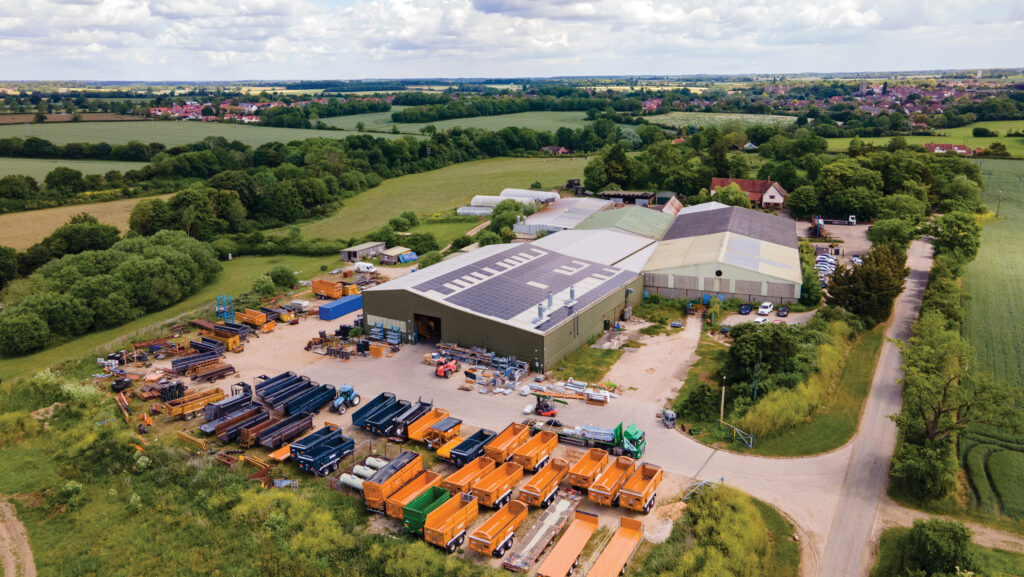 © Richard Western
© Richard Western In the face of intense competition, not only among themselves but from EU-based manufacturers, UK companies building muckspreaders and slurry handling equipment continue to hold their own with a decent chunk of this relatively high-volume market.
Muckspreaders have long been a speciality of UK makers, with those in England and Scotland, in particular, leading the way with well-established designs.
This includes dual-purpose chain flail and impeller spreaders, that have stood the test of time, as well as heavy-duty, ever larger rear discharge machines for bigger farms and contractors.
See also: Tractors: where are they made?
When it comes to slurry equipment, companies based in Northern Ireland cover pretty much every size and equipment category, as do their counterparts in Ireland, catering for small livestock units and high-volume contractors alike.
Manufacturers in continental Europe, meanwhile, have most success exporting large, professional-class slurry and digestate tankers, and contractor-scale – often self-propelled – manure spreaders.
Great Britain
There are some very familiar names in the muckspreader business based the length and breadth of Great Britain.
From Aberdeen-based Charles J Marshall to Teagle Machinery in the far south-west near Truro, Cornwall, and from Harry West on the England/Wales border at Prees to Richard Western’s Framlingham base outside Ipswich, Suffolk.
Add to that list Agri-Hire, also close to Ipswich at Bramford, the GT Bunning operation at Gressenhall near Dereham, Norfolk, and Ktwo – now under the same ownership as Northern Ireland’s Redrock Machinery – near Aylesbury, Bucks.
All produce their own take on large-wheeled, rear discharge spreaders, a layout now ubiquitous across the farmscape.
Agri-Hire, Bunning with the Lowlander range, Teagle (Titan), Harry West (Maelstrom) and Richard Western (Delilah) build machines to a similar layout, while Marshall’s Vesuvius is unique with its hydraulic push-out system in place of bed chains and slats.
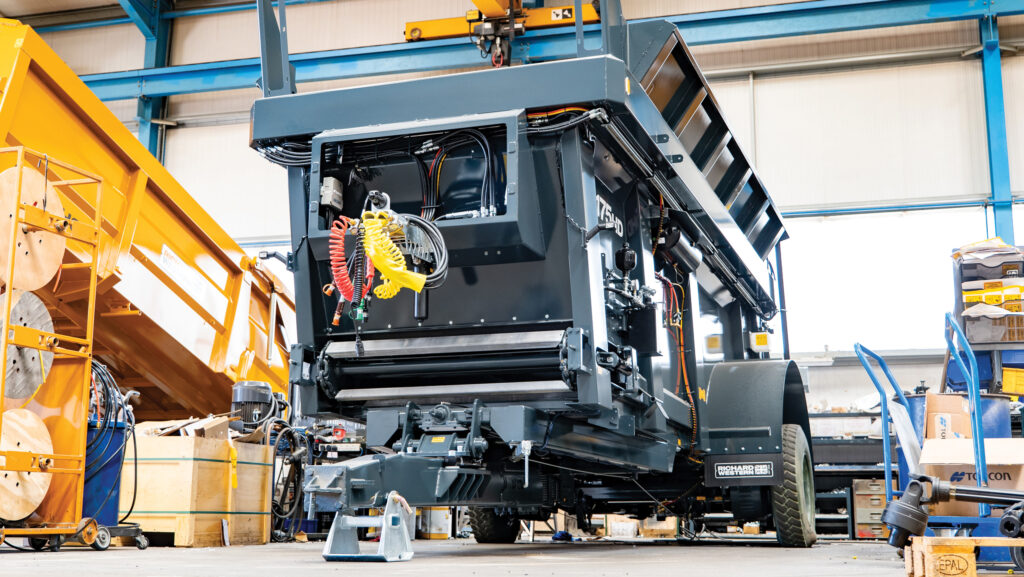
© Richard Western
Apart from the Maelstrom, Harry West specialises in the capabilities of its Dual Spreader in successfully applying strawy manure and liquidy slurry from a low, side-mounted impeller drum.
This layout is also evident in the Side Discharge Spreader from Richard Western and the Powerspread built by another manure spreader maker, Shelbourne Reynolds, at its Stanton base near Bury St Edmunds, Suffolk.
Slurry tanker manufacturers are less prolific – Marshall has the most comprehensive range, producing sizes from 5,500-15,900 litres, while Gissing Farm Equipment at Brigg, 20 miles north-east of Lincoln, focuses on larger sizes up to 33,000 litres and features that can include a hydraulic suction pipe arm.
Irrigation specialist Greencrop, part of the Burgess Group at Beeston near Kings Lynn, Norfolk, has re-entered the tanker market with an expanded range culminating in an 18,000-litre model.
Farmers and contractors needing an umbilical pumping trailer can turn to Tramspread and the built-from-scratch factory at Mendlesham, mid-Suffolk, completed in 2021, that doubled production and warehousing space.
The company produces bespoke pump and reel sets, as well as tractor- and tanker-mounted drop tube dribble bars and trailing shoe applicators.
Across the country at Worleston near Nantwich, Cheshire, Spreadwise also builds engine-powered pump sets as part of an extensive slurry handling range.
Northern Ireland
Over the water in Northern Ireland, producing slurry spreading equipment is an added activity for firms such as trailer makers Herron Engineering at Castlewellan, County Down, approaching 30 miles south of Belfast, and Redrock Machinery further to the west at Collone, County Armagh.
Agquip at Ballymoney, north-west of Belfast, SlurryKat at Craigavon and Slurryquip in Clough near Downpatrick, both 25 miles south of the city, specialise in tractor-mounted dribble bars and trailing shoe applicators.
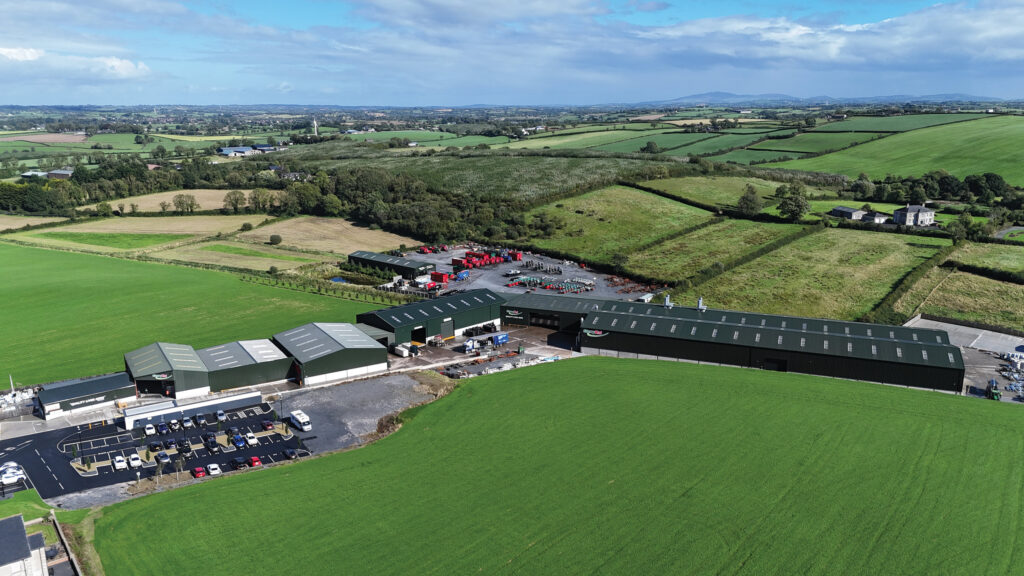
© SlurryKat
SlurryKat’s dribble bar range now extends to 24m and Slurryquip produces a novel front-mounted dribble bar installation for its Cerberus tanker.
Fleming Agri at Newbuildings near Londonderry and NC Engineering in Hamiltownsbawn, 50 miles west of Belfast, build tankers as part of a wider product range that also includes manure spreaders.
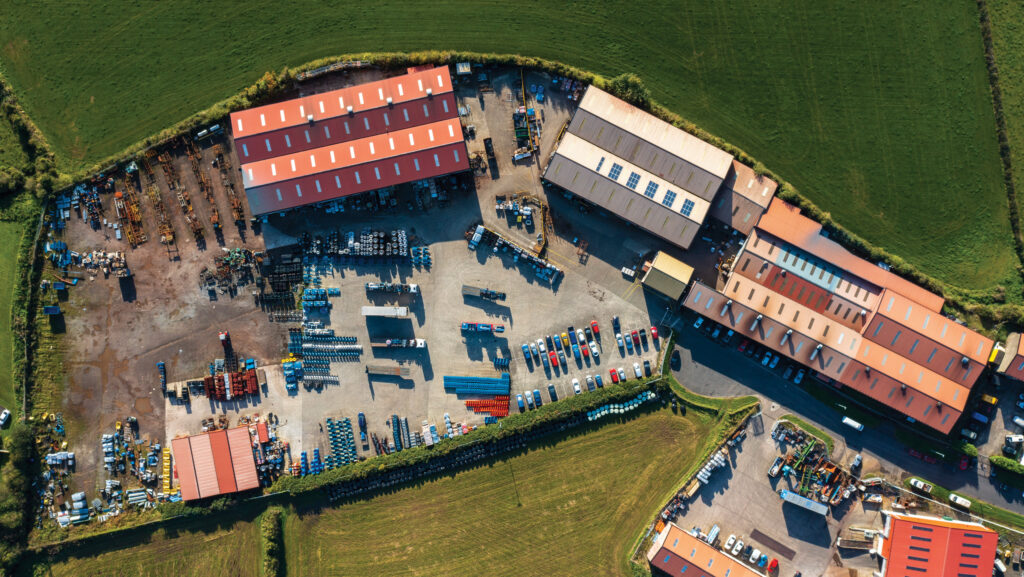
© FlemingAgri
That activity is matched by Nugent Engineering, whose factory is in Galbally, 50 miles west of Belfast.
SpreadPoint at Downpatrick (better known for trailed lime/fertiliser spreaders) and Tusk Machinery, based nearby Ballynahinch, both a little more than 20 miles south of Belfast, respectively produce rear discharge and side-flinging muckspreaders, the latter also by Quad-X, a Blaney Group business at Ballymena, 40 miles north of Belfast, but on a mini scale for ATVs.
Newrock Engineering at Lisburn, 12 miles south-west of the city, is set for a revival under new management, building slurry pumps and tankers.
Ireland
The counties of Ireland are another hotbed of slurry tanker and muckspreader production, with Belmac Engineering at Belmont, Grass Technology (better known for zero-grazing kit) near Borris to the south, Major Equipment in Ballyhaunis, south of Galway, and Mastek, based 75 miles north of Dublin, all focused on slurry kit.
Agri-Spread, a neighbour of Major Equipment, with its VB Pro rear beater machines.
Keenan down in Borris, with the novel farmer-inspired Orbital front rotor and forward-pushing bulkhead design, concentrate on muckspreaders.
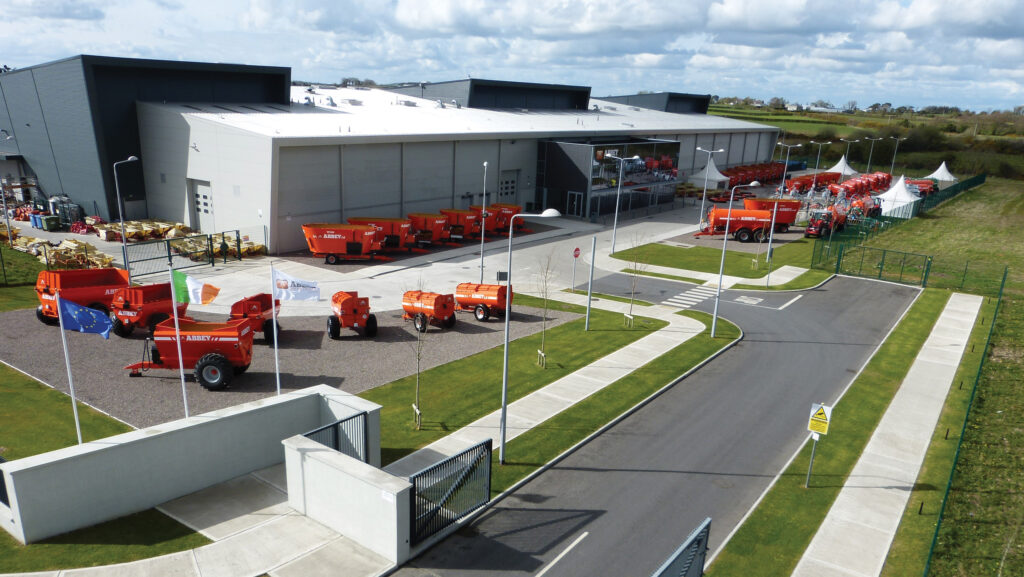
© Abbey Machinery
Having a foot in both camps is the preferred approach for Abbey Machinery, with side impeller and flail spreaders built at Toomevara in the south-west of Ireland, Conor Engineering (flail and rear beater designs) based south of Galway at Tubber, and Cross Agri near Rathangan, County Kildare, with its Super-Spread rear beater machines.
Hi-Spec Engineering, at Begnalstown, County Carlow, also produces tankers and spreaders, the company’s unique Xcel spreader design, with its bed conveyor feeding muck into a bank of shrouded chain flails for a pair discs below to throw far and wide, has recently had a shot in the arm with an up-scaled version of the 12t model hitting 20t capacity.
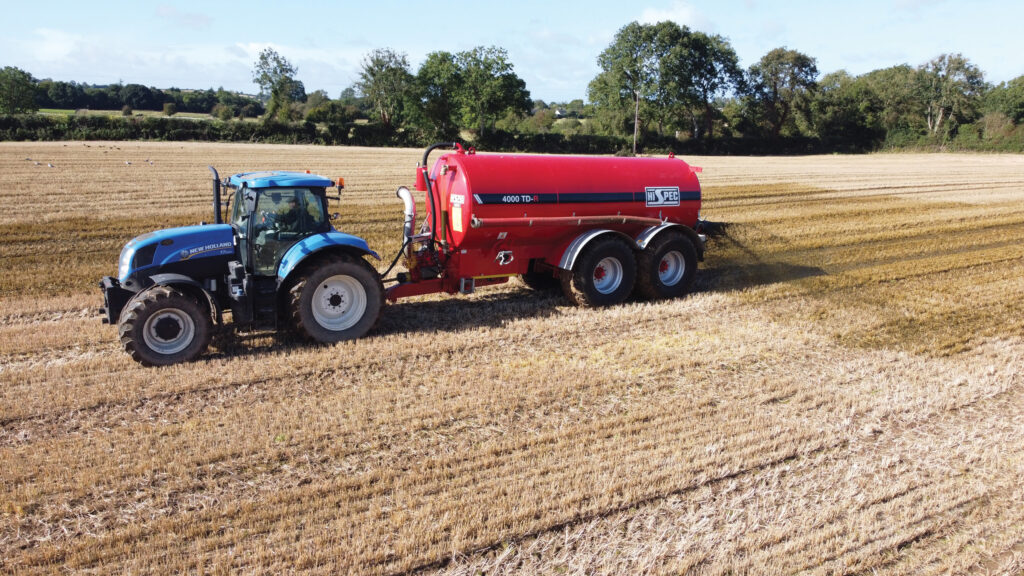
© Hi-Spec
Diverse fabrication firm Rainbow Engineering at Ballyshiel, 80 miles west of Dublin, builds chain flail side spreaders, including sizes for compact tractors supplied in Britain by Siromer.
Belgium
Joskin Group dominates slurry and muck spreading equipment production in Belgium – and has a strong presence in neighbouring France with two production facilities, and also one each in Luxembourg and Poland.
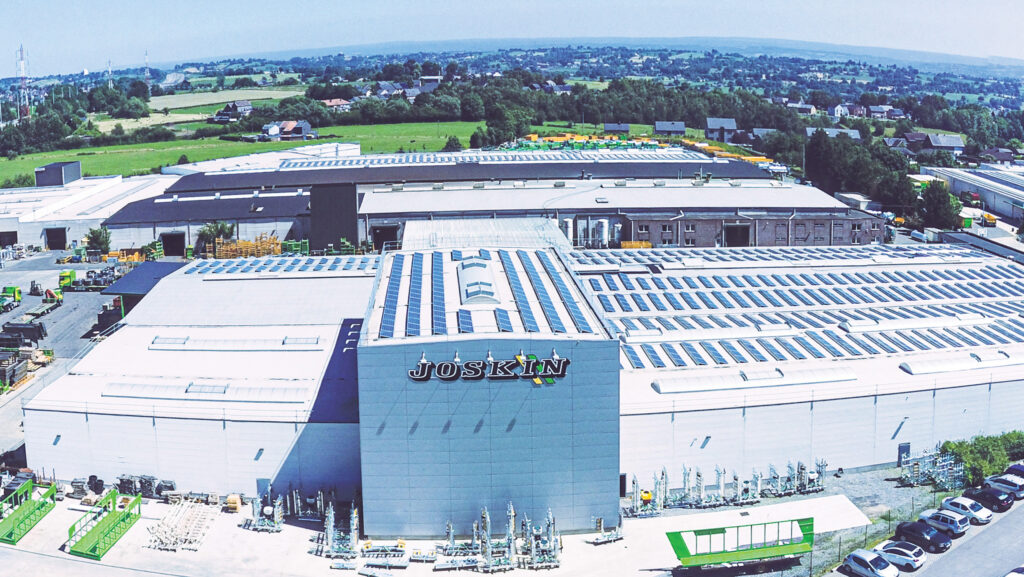
© Joskin
At 25ha, the facility in Poland is the largest of the group’s five plants, while the new factory in Luxembourg, which should be completed later this year, will expand capacity for building Joskin muckspreaders.
France
Across the Channel, France has just two manufacturers selling into Great Britain, both located in the north-west dairy region of Brittany.
Rolland focuses on muckspreaders with its Rollforce large wheel and Rollmax multi-axle machines.
The Pichon factory in Landivisiau, built just nine years ago, manufactures slurry tankers and a rear discharge spreader range.
Pichon was acquired by Samson Agro in 2019.
The Netherlands
A contractor’s first port of call when looking at self-propelled applicators may well be one of three Dutch manufacturers – Vervaet, based in Biervliet in the south of the country, Vredo located 60 miles south of Amsterdam, or Oxbo, which previously operated as Ploeger Machines, headquartered at Roosendaal, 40 miles south of Rotterdam.
Vervaet, represented here by J Riley Beet Harvesters, builds the four-wheel Quad and three- or five-wheeler Hydro Trike with a maximum 20,000-litre capacity and up to 530hp, while Vredo, through 2024-appointed dealer Kirby Ag, supplies four- and six-wheel machines.
These go to 32,000 litres with 710hp and a choice of surface injectors, while a Tebbe spreading body is an option for solids.
Agco’s now defunct Terra-Gator is the inspiration for Oxbo’s three-model range following the Dutch operation’s appointment to provide parts and service support for Terra-Gators still in service.
The 500hp four-wheel drive/steer, 400hp three-wheel drive/steer and 550hp five-wheel drive/steer machines can be equipped for slurry or muck application, peaking with the AT5105’s 25,000-litre tank or 25t spreader body, the latter recently adapted to drop manure in front of a trailed cultivator for immediate incorporation.
Kaweco is closely associated with big-capacity mounted and towed slurry tanks for the Claas Xerion, creating a four-wheel self-propelled unit with up to 462hp and 16,000-litre capacity or up to 30,000 litres in the articulated format.
Late last year, parent group Royal Reesink closed the business, but it has been resurrected by Garant slurry equipment maker Kotte Group with a new base in Baak, 20 miles south-west of Appledoorn and close to its original home.
Elsewhere in the Netherlands, Veenhuis at Rijssen, 80 miles east of Amsterdam and part of the SVGroup with Schuitemaker, builds slurry tankers and large-scale umbilical equipment including the Rotamax hose reel and injector combination; the firm’s UK agent is Agri Industry Solutions in Suffolk.
Bomech, Evers Agro and TBL Techniek – all roughly 100 miles east of Amsterdam and represented by J Riley Beet Harvesters – are Dutch specialists in tanker- and tractor-mounted dribble bars and injectors, as are Roelama at Alphen, 50 miles south of Rotterdam, whose products are imported by Tramspread, and Schouten Machines at Uddel, 54 miles west of Amsterdam, represented by Wox Agri.
Austria
From its headquarters in Voitsberg, 140 miles west of Vienna in southern Austria, the Bauer Group oversees production of slurry tankers at its German subsidiaries while manufacturing slurry pumps, separators and other ancillary equipment.
Germany
Big ticket self-propelled slurry spreading kit is a specialism of Holmer Maschinenbau, part of the Exel Industries group and located at Schierling, 80 miles north of Munich.
The Terra Variant is produced in two models with up to 652hp and 21,000-litre capacity, using a tank system sourced from slurry specialist Zunhammer, located 400 miles further north near Munster.
Bauer Group’s Eckart subsidiary, located in Schauffling to the south-west of Nuremburg, also taps into this sector with mounted and fifth-wheel trailed tankers for the Claas Xerion previously built by SGT and culminating in a 30,700-litre tandem or triple-axle version.
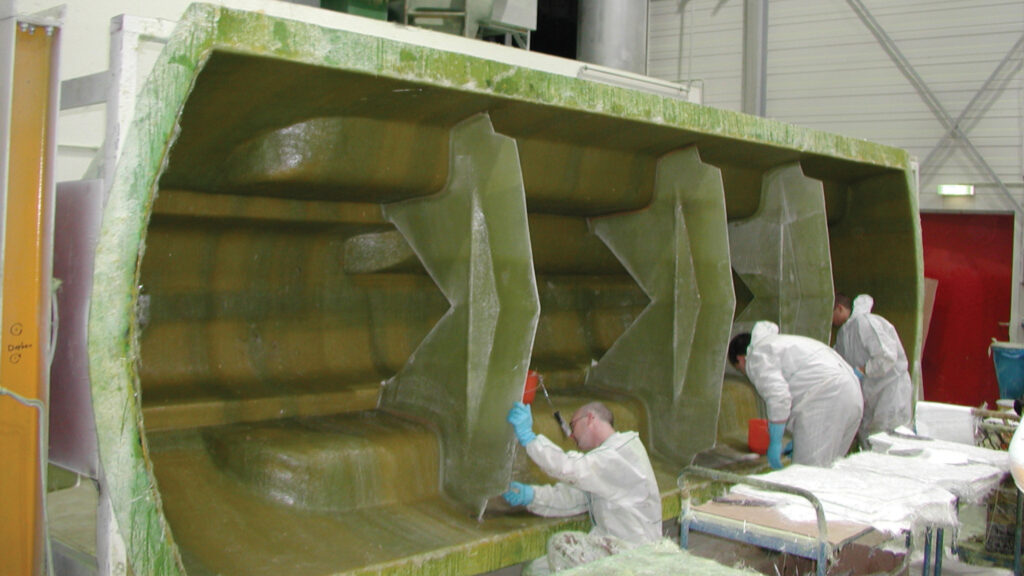
© Bauer Group
Eckart specialises in polyester tank construction, while steel tankers are built by another Bauer subsidiary, BSA at Marktschorgast, north-east of Nuremberg.
Vogelsang, meanwhile, specialises in tractor- and tanker-mounted dribble bars, and trailing shoe and strip cultivation slurry applicators, while its macerating distributor units are widely used by manufacturers of similar kit.
Other producers of tankers available in Britain include Kotte Landtechnik at Rieste, near Osnabruck in northern Germany, with its Garant units available through Continental Soil Technology in Gloucestershire, and Kumm-Technik, based 40 miles south-west of Cologne, whose newly appointed agent is J Riley Beet Harvesters.
Fliegl Agrartechnik builds tankers and spreaders at Mühldorf am Inn, 50 miles east of Munich, while Strautmann’s muckspreaders, supplied by Opico, come from the headquarters factory at Bad Laer near Osnabruck in north-east Germany, using some parts sourced from the company’s component plants in Poland and Hungary.
Ludwig Bergmann also builds “traditional” rear discharge spreaders at its Goldenstedt factory, 30 miles south-west of Bremen – Samagri has just become its southern England distributor, with RMV Services covering the North.
At Bissendorf in Germany, Tebbe Landmaschinen builds trailed muckspreaders, but its principal involvement in Britain, where products are supported by dealer Kirby Ag, is the supply of spreader bodies to Vredo and Oxbo for their self-propelled machines.
Denmark
Viborg in northern Denmark is home to Samson Agro, where the company manufactures both slurry tankers and manure spreaders destined mainly for large farming and contracting operations.
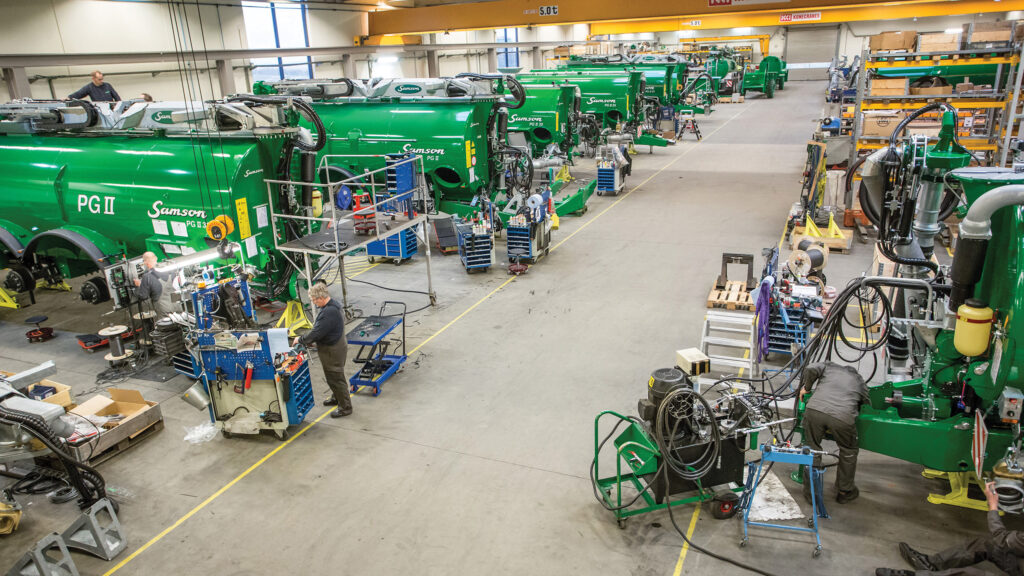
© Samson
A new facility for the production of trailing shoe booms has recently been completed, adding about 30% to capacity.
And as a result of acquiring the Pichon Industries business in 2019, the group has production of small to mid-size farm muck and slurry kit in Poland and France.
Poland
The Joskin group’s largest production plant, covering 30ha, is in the west of Poland, and Samson Agro has a facility at Gieralcice in the south-west, acquired with its Pichon acquisition.
Poland is also the source of RS Agri’s new Atlas rear beater manure spreader, built to a spec suited to the UK market by the Hampshire company’s manufacturing partner located south-east of Poznan.
And Polish manufacturer Ando Tech, at Szlachcin in western Poland, supplies its tall wheel, rear beater machines in Britain through Machinery Sales Europe, based in High Wycombe, Buckinghamshire.
Meanwhile, HF Evans & Sons at Cardeston, near Shrewsbury, brings in spreaders of the same style from Euro Milk, manufacturing in Wysokie Mazowieckie, 95 miles north-east of Warsaw.
The US
If a traditional low-slung muckspreader is just what is needed to run behind a modest agricultural or compact tractor, or even an ATV, then Meadow Machinery has the solution.
Millcreek’s small-scale machines are shipped all the way from Honey Brook, Pennsylvania, where the company makes seven sizes of pto- and ground-driven versions with low-slung beds for hand or machine loading.
Rotaspreader still going strong
It seems barely credible that a machine invented in the 1960s is still being manufactured and used today.
But that is the case with the flail or barrel type manure spreader concept that originated as the Howard Rotaspreader.
Much liked for its simplicity with minimal moving parts, the Rotaspreader could handle slurry and yard muck, making it a versatile solution for all livestock farms, and even for contractors in its biggest iteration.
The machine became a runaway bestseller, especially in the UK and Ireland.
Although the Rotaspreader and the company behind it are long since gone, the legacy lives on in the factories of several manufacturers.
Marshall maintains its four-model range out of the Bucksburn factory near Aberdeen.
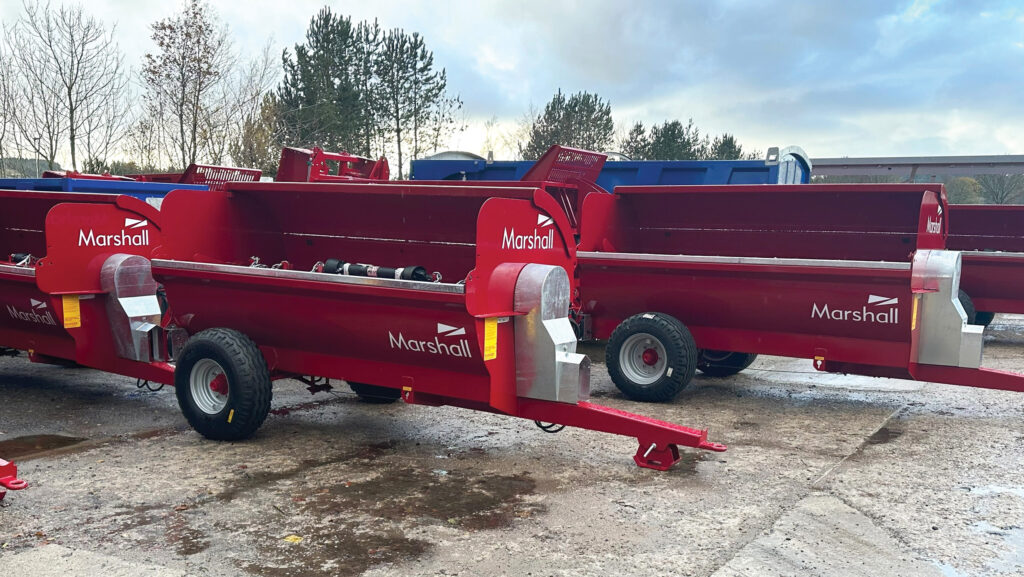
© Marshall
In Ireland, Abbey, Conor and Hi-Spec keep the flag flying for the simple spreaders, as does Rainbow Engineering; its model for compact tractors is supplied in Britain by Siromer.
Likewise, in Northern Ireland where Agrimac, Fleming and Nugent have been joined more recently by SpreadPoint and Tusk Machinery in building their own versions with a few detailed variations.
For example, the steel hydraulic pipework on SpreadPoint’s model.
Even Quad-X, the Blaney group’s ATV implement arm, produces a pair – the engine-powered single-axle Muck Junior and the tandem axle Muck Master, capacity rated at five and eight wheelbarrow loads, respectively.
For small agricultural and compact tractors from 30hp there are linkage-mounted novelties.
The 0.76cu m MiniMuck from Fleming Agri, the 1cu m Mini Muck produced by Nugent Engineering, and the 2cu m Muck Spreader from St Albans, Herts-based J Silk Agricultural.
Investing in efficient production
Capacity increases, reducing costs through improved efficiency, and making quality gains, are common goals among recent investments in manufacturing capability made by muck and slurry equipment companies.
The manufacturing complex at Gressenhall in Norfolk, where GT Bunning turns steel into heavy-duty manure spreaders, is a far cry from the village green blacksmiths where the business was founded in 1906.
It now boasts a £6m state-of-the-art factory extension, which was completed in 2023.
This 6,840cu m facility accommodates the cutting, folding, manufacturing and painting processes with smoother workflows and increased capacity.
A £1.3m shot blasting and painting facility is part of the new complex; it has a preparation area between the two bays and lifts within the booths so that painters have access to the entire machine.
In the fabrication section, a 12kW laser cutter has replaced a plasma cutting unit for improved accuracy and consistency, and allows Bunning to notch and tab more parts for quicker construction.
Given the scale of modern spreaders, a new 320t brake press capable of bending 6m sheets is an essential tool.
Laser correction allows more bending with increased efficiency over the outgoing press.
Working conditions for the more than 100 full-time employees are markedly improved from the old buildings.
Notably the increased natural light, air recirculation units and on-torch extraction for welders.
At Fleming Agri, a 2,000sq m extension at the company’s factory in Newbuildings in 2022 created more space for building larger machines.
It also accommodated a computer-controlled two-pack painting booth.
Profile cutting of components was brought in-house the following year after a plasma cutting table was installed in 2023.
The year after, a new tube laser brought faster, cleaner and more accurate steel preparation.
In 2025, Fleming Agri has a 650sq m extension under way for increased raw steel storage while liberating more machine finishing capacity, and an office extension will be built later this year.
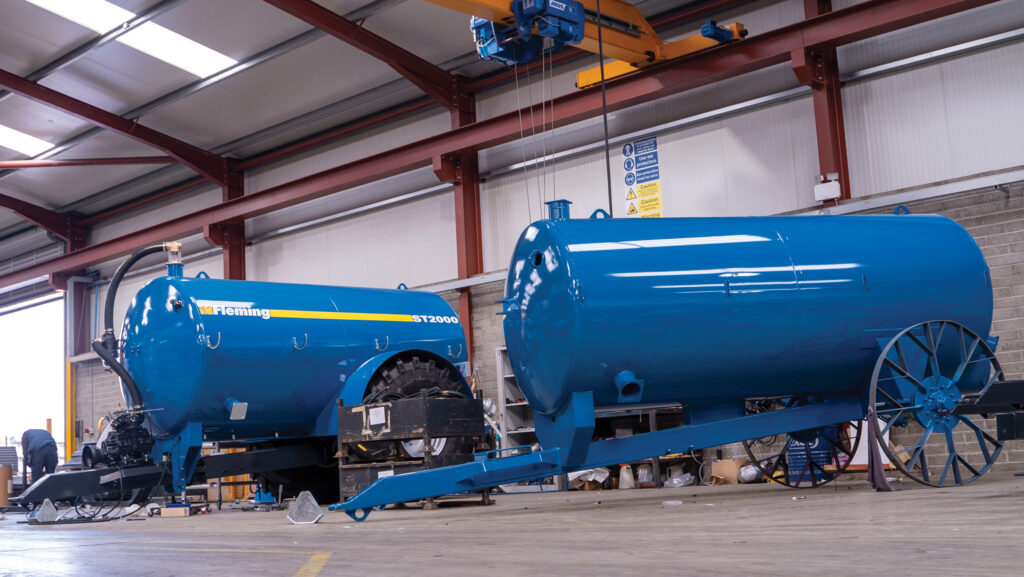
© Fleming Agri
Marshall spent “a significant seven-figure” sum on a new paint facility at Bucksburn in 2023.
The facility comprises a shot-blast facility, an overhead monorail for moving products through the system and four temperature-controlled spray booths for state-of-the-art two-pack pain application.
The investment has reportedly improved paint finish and durability.
Two new overhead cranes are speeding up assembly and reducing handling marks in the product finishing area.
There has been “significant” investment in robotic welding at Richard Western in recent years.
This was to effectively meet growing demand, enhance the consistency and precision of manufacturing processes, and maintain high-quality standards even during peak production periods.
The company highlights that the technology also supports employee wellbeing by automating repetitive welding tasks while improving overall workplace safety and efficiency.
Increased paint application efficiency was the focus of a 2024 update at Shelbourne Reynolds’ 2ha complex at Stanton near Bury St Edmunds.
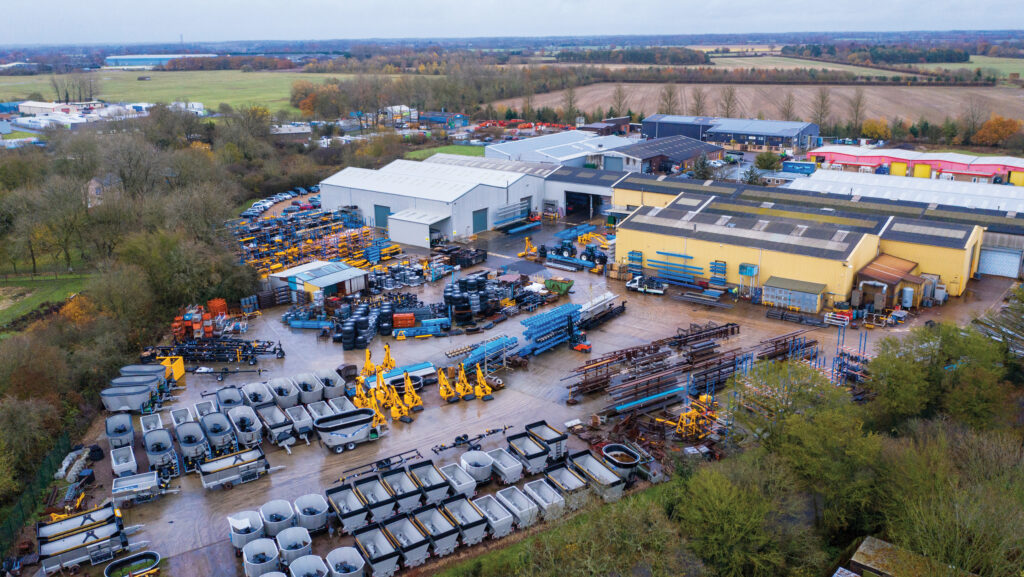
© Shelbourne Reynolds
Automated powder coating guns have reduced the amount of coverage applied manually and the powder recovery system has cut that overall volume used.
More heavyweight installations in recent years include a 10kW laser cutter with automatic loading and unloading, and a 230t brake press with a large 4.2m table to bend and fold steel components to fine tolerances.
A second storey has recently been added to the company’s office building.
It also emphasises the ongoing investments that go into staff training, particularly for the safe operation of on-site industrial equipment.
Teagle’s newest investment also focuses on paint quality – a £2.75m double powder coat line, completed summer 2023.
This has improved long-term corrosion resistance and the aesthetic finish of its Titan spreaders and other machines.
Advanced shot-blasting techniques aim for optimal surface preparation.
This is followed by a dual-layer powder coating process for a more robust, consistent finish, with improved paint adhesion and reduced risk of chipping or wear over time.
The need for expansion in light of growing sales prompted Tramspread to up sticks and move out of its Mendlesham home into purpose-built premises just outside the village.
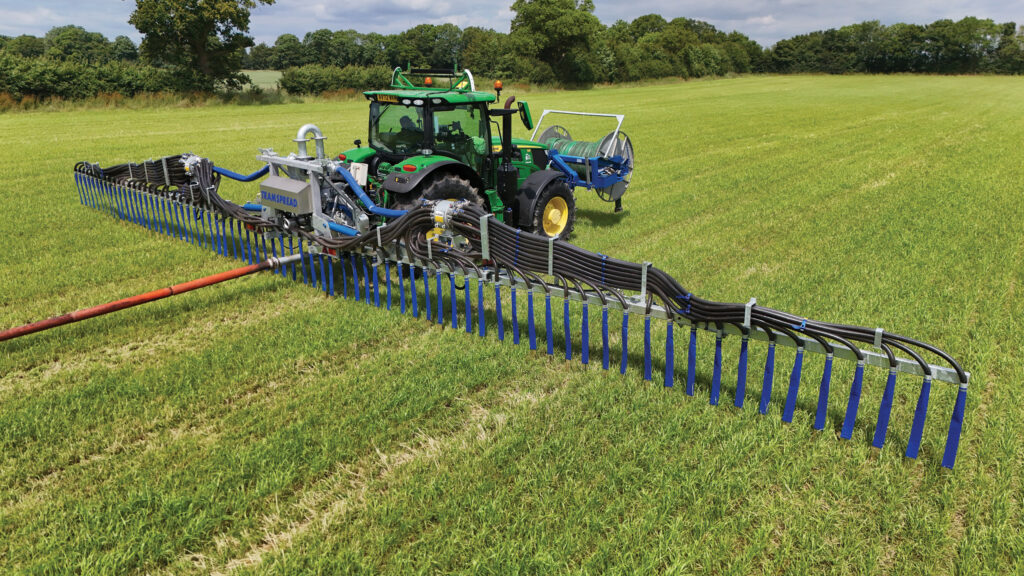
© Tramspread
The new factory site was developed from scratch to meet the company’s needs.
It provides double the manufacturing and warehousing floorspace and a dedicated office, conference and administration building.
A practical addition, given the nature of Tramspread’s product range, is a small lagoon that enables products such as pumps to be run-up and tested prior to dispatch.
A combination of in-house production and outsourcing of some fabrication processes to a local specialist ensures high-quality standards and plentiful supply of parts, says the company.
It also aims for a swift response to any issues to minimise UK customer downtime.

